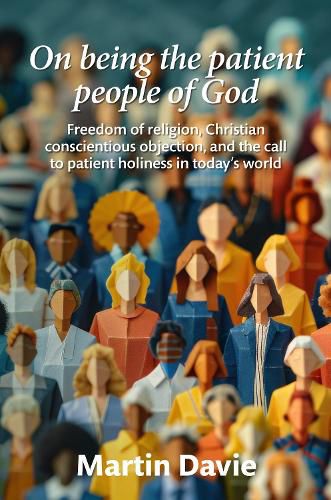Readings Newsletter
Become a Readings Member to make your shopping experience even easier.
Sign in or sign up for free!
You’re not far away from qualifying for FREE standard shipping within Australia
You’ve qualified for FREE standard shipping within Australia
The cart is loading…






This title is printed to order. This book may have been self-published. If so, we cannot guarantee the quality of the content. In the main most books will have gone through the editing process however some may not. We therefore suggest that you be aware of this before ordering this book. If in doubt check either the author or publisher’s details as we are unable to accept any returns unless they are faulty. Please contact us if you have any questions.
In this new study Martin Davie looks at the key issue of freedom of religion from a theological, historical and pastoral perspective. He demonstrates that contrary to the widely held idea that belief in freedom of religion only emerged at the time of the European Enlightenment in the eighteenth century, in fact its origin lies in the teaching of the Bible and in the witness to this teaching borne by an unbroken line of Christian thinkers from the time of the Early Church Fathers Tertullian and Lactantius onwards.
Davie explains that the Christian belief in freedom of religion was enshrined in international and national law since the proclamation of the Universal Declaration of Human Rights in 1948. Freedom of religion is still under attack even in liberal Western democracies where Christians have often come to be seen as the 'bad guys' because of their opposition to the modern culture of personal and sexual autonomy.
Finally, Davie suggests that in the face of this Christians are called to build on the example provided by the Early Church by making use of the freedom given to them by God to live lives of patient holiness, involving obedience to God's will, and the teaching of the Christian faith, in the belief that God will use their faithful witness to further his good purposes in the world. He also explains that conscientious objection to engaging in forms of behaviour contrary to God's will is an integral part of faithful witness.
This book will be an invaluable resource for all Christians wanting to better understand the origin and nature of freedom of religion and what it should mean in practice for Christian believers today.
$9.00 standard shipping within Australia
FREE standard shipping within Australia for orders over $100.00
Express & International shipping calculated at checkout
This title is printed to order. This book may have been self-published. If so, we cannot guarantee the quality of the content. In the main most books will have gone through the editing process however some may not. We therefore suggest that you be aware of this before ordering this book. If in doubt check either the author or publisher’s details as we are unable to accept any returns unless they are faulty. Please contact us if you have any questions.
In this new study Martin Davie looks at the key issue of freedom of religion from a theological, historical and pastoral perspective. He demonstrates that contrary to the widely held idea that belief in freedom of religion only emerged at the time of the European Enlightenment in the eighteenth century, in fact its origin lies in the teaching of the Bible and in the witness to this teaching borne by an unbroken line of Christian thinkers from the time of the Early Church Fathers Tertullian and Lactantius onwards.
Davie explains that the Christian belief in freedom of religion was enshrined in international and national law since the proclamation of the Universal Declaration of Human Rights in 1948. Freedom of religion is still under attack even in liberal Western democracies where Christians have often come to be seen as the 'bad guys' because of their opposition to the modern culture of personal and sexual autonomy.
Finally, Davie suggests that in the face of this Christians are called to build on the example provided by the Early Church by making use of the freedom given to them by God to live lives of patient holiness, involving obedience to God's will, and the teaching of the Christian faith, in the belief that God will use their faithful witness to further his good purposes in the world. He also explains that conscientious objection to engaging in forms of behaviour contrary to God's will is an integral part of faithful witness.
This book will be an invaluable resource for all Christians wanting to better understand the origin and nature of freedom of religion and what it should mean in practice for Christian believers today.